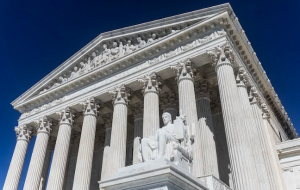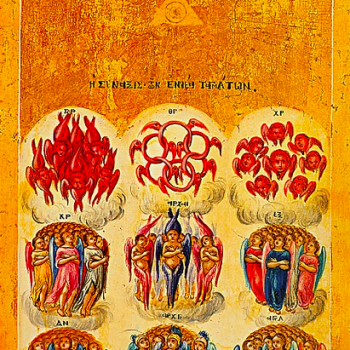Content Warning: Given the topic, this post uses words such as abortion many times, and discusses some aspects of fetal death, both by abortion and by miscarriage. Reader discretion is advised.
As all of my readers doubtless know already, it looks as if the Supreme Court is poised to overturn the 1973 decision in Roe vs. Wade that, in effect, made abortion legal at the national level. I don’t know all the details here—like the fairly big detail of whether the leaked opinion makes the reversal a certainty or only a likelihood. But it sure looks like we might be looking at a post-Roe America, fifty years after it began.

As a pro-life person, I’d like to be happy about this. The prospect that the law may soon recognize and defend the most helpless among us certainly gives me some relief. But the circumstances in which this is happening, and the people who are the motive force behind it, do worry me quite a bit. Simcha Fisher said on Twitter a couple of days ago that it feels kind of like achieving your lifelong dream of owning a house, and then finding out the place is haunted.
There are a few ways I can see this going (and doubtless plenty more I can’t guess at). We should note a few pertinent facts first, though.
What Won’t Change
As many but not all people realize, overturning Roe wouldn’t automatically make all or any forms of abortion illegal. What it would do (or so I understand) is cause the legal issue to revert to state legislatures, which would then have the power to make local laws about abortion. This is pretty much how it was before 1973: a couple of states had abortion on demand, most prohibited it entirely, and a few allowed it certain exceptional circumstances (such as for victims of rape). I’m not sure exactly what the legal situation would be between the overturning of Roe and the implementation of new state laws, but it wouldn’t be an immediate ban.
This, in turn, means that while the pro-life movement would probably become more local and less national, it wouldn’t go away. Obviously the pro-choice movement wouldn’t either. The terms of the discussion would partly change, but the discussion as such wouldn’t be affected much.
The reasons people1 seek abortion are not likely to change either. While the rationales for legally permitting abortion come in many different and sometimes contradictory types, an individual’s causes for getting an abortion fall largely (though no, not exclusively) under the categories of personal health and economic difficulty. Many mothers who seek abortions already have children, and either fear being permanently disabled or killed due to complications from giving birth, or cannot afford to feed another mouth. This situation will be exactly the same. (There are legal changes that could impact it, but whether abortion is legal isn’t one of them.)
And this, of course, also means that the needs of pregnant people aren’t going to change. Or rather, they aren’t going to change a lot—there are some respects in which they will change in any state that severely restricts or entirely bans abortion.

Two New(ish) Challenges
One of these is that certain forms of abortion that are more dangerous to the mother as well as the child will become more common: the “back-alley” abortion and self-abortion. I honestly don’t know enough to say whether there’s any truth in the pro-choice trope that “banning abortion will just lead to women getting unsafe abortions,” or if so, how much; it’s not as though back-alley abortions aren’t performed now. But it is true that there will at any rate be more underground abortions than before, partly because all abortions will be underground. Helping parents recover from these procedures may not be essentially different now than it was before, but the scale of the need will change.
Likewise, self-abortions—or attempts at it—will become more common (partly because it’s easier to keep secret). Again, self-abortion exists right now; this won’t be a completely new phenomenon. But there will be more of them, which, because of the nature of all DIY endeavors, means more of them going wrong. Here too, the nature of the help they need won’t be entirely different, but a lot more of them will need it, and need more of it.
In both cases, however, there is another and much darker possible change, one some Southern states seem eager to realize. That is the possibility of the law going after not only clinicians who perform abortions, but women who get them—and not necessarily restricting themselves to actual abortions, either.
The Miscarriage Problem

In a sane world, anybody would be able to see that 1) a parent miscarrying is in no way the same thing as getting an abortion, and 2) that since the law considers all persons innocent until proven guilty, prosecuting miscarriages because they might have actually been secret abortions is an insane violation of human rights. And this, of course, is supposing that we’re prosecuting women who get abortions in the first place—something I for one absolutely don’t want, and which most of the pro-lifers I’ve met would equally abhor.3 Both privacy, which Roe was originally about, and due process stand in what I consider clear opposition to any such policy.
But … there are people in the pro-life movement who do want to do that. And there are some who do want to dispense with the presumption of innocence, too.
Moreover, there are certain procedures that some people (on both sides of the divide) may classify as abortions, but others do not, and this forebodes severe practical problems. The best-know of these is probably the treatment of ectopic pregnancy.4 One standard treatment for an ectopic pregnancy is to remove the fetus, sometimes by removing the fallopian tube itself. In the current state of medical science and technology, we have no way of preserving the infant’s life—the only question is whether the mother will die too. Artificial wombs may at some point become sophisticated enough to be an alternative; but as things are, ectopic pregnancies die, no exceptions. Accordingly, the Catholic Church does not regard these removals as abortions, but as morally permissible: the fetus’ death isn’t the intention here, it’s an unavoidable fact.5 In effect, the Church regards this as a specific, atypical form of miscarriage. However, some pro-choice people would also call this an abortion; and even some people who term themselves pro-life, but make exceptions for the health of the mother, would call this one of their exceptions. So what real-world implications would “prosecuting abortive parents” have for ectopic pregnancies?
A Dark Forecast
I see the reversal of Roe going one of three possible ways. I’ll begin with the grimmest.

The mainstream pro-life movement has aligned itself with the GOP since the Reagan administration, and the GOP has aligned itself with closet and even “out” fascists for the last several years. It’s therefore quite possible that the political victory of the pro-life movement will mean the effective ascendancy of American fascism, wearing the colors not only of patriotism but of Christian orthodoxy. Even of Catholic orthodoxy—the GOP has contrived very effectively to make about half of US Catholics ignore the fact that their policies conflict with just about every other aspect of the Church’s social teaching. There’s little reason to suppose that the thrill of victory will lead to these Catholics’ vision suddenly clearing.
What would ensue would then be, essentially, a two-way struggle. On the one side would be the fascists, with their allies and dupes. On the other, those who oppose fascism for whatever reason: those whom fascism explicitly targets (mostly minority racial and sexual identities), some sincere classical Liberals and libertarians, the political Left (such as it is in this country), religious people whose beliefs won’t fit into the fascist framework, and some others.
I’m not optimistic about the outcome of such a situation. We have only begun to reckon with our country’s history of racist oppression; the backlash against that reckoning is exactly what makes a practical alliance with fascism appealing, even to people who don’t harbor conscious prejudice against racial minorities, but just want to enjoy the familiar—and unexamined—America that they grew up in. A century ago, Italy, Spain, and Germany all famously lost their own internal struggles against fascism, partly because the great mass of citizens couldn’t be convinced the danger was real. And while Mussolini and Hitler were ousted by war, Franco carried right on until the end of his life, and the return of democracy to Spain was, viewed from the outside, a stroke of blind good luck. Given American military hegemony, I think there’s very little chance of us being rescued by defeat, if fascism triumphs here.

A Twilit Forecast
Second, let us consider a possible alternative—one that I both think and hope is a little likelier than the preceding. In this scenario, fascism does become a political force in US politics, but it doesn’t gain control of the national pro-life movement, or even of an overwhelming majority of it. Rather, the division of the national movement by state causes allows other, more local causes and alliances, rooted in regional cultures, to gain prominence. The pro-life movement in, say, the Pacific Northwest perhaps finds it easy to incorporate environmentalist concerns into its activities now that it’s operating more locally; maybe the pro-lifers of Appalachia rapidly turn their attention to things like workers’ rights and universal health care. In this atmosphere, those pro-lifers who really were single-issue voters, holding their noses against most other things about the GOP to do so, become a recognizable element in the game—more numerous than the fascists had counted on, though probably less than they themselves had supposed.
If this happens, I think what we’ll eventually get is a crystallization of the Seventh Party System. What that’ll look like, even in broad strokes, I don’t know. My only real guess is that abortion, now a state issue rather than a national one, will cease to be one of the principal divides in American politics. It’ll have merits and flaws, just like the Sixth Party System did, and it’ll almost certainly be used to manipulate the religious in fresh new ways. But it will, primarily, be different, and—if God is merciful to us—fascism (whether explicit or attenuated) will be merely one ingredient in it, not its characterizing trait.
A Bright Forecast
Now let’s turn to an impossibly rosy idea: more of a thought experiment than a prediction, really. In this scenario, after a few hiccups, a clear majority of the pro-life movement turns from the successful reversal of Roe to the project of building a genuinely pro-life society at the national level. Common conservative attitudes and behaviors that effectively punish women for choosing life, like slut-shaming, are seriously confronted; welfare programs, universal health care, maybe even UBI, are instituted or expanded; major reforms of the American adoptive and foster systems are undertaken. Above all, the GOP learns, once and for all, that it cannot corner the loyalties of Catholics any more: not because they return to reliably voting Democrat, like before 1973, but because a definite majority of Catholics will vote for whatever party, policy, or candidate most closely aligns with Catholic social teaching, instead of warping that teaching to suit their political convenience.

This does not result in Utopia. It doesn’t even result in a reasonably stable social democracy, at least not very quickly; capitalism and anti-Catholicism remain powerful forces in American society and therefore in American politics. This scenario probably also results in the Seventh Party System. But some real strides towards a more just society are made, and the new political sides do start—in a very general way—to line up with “for CST” and “against CST.”
In my opinion, this is not merely the least likely scenario of the three, but almost an out-and-out pipe dream. It isn’t impossible in the sense of defying the law of non-contradiction; but the notion that people’s political allegiances would be not just this malleable, but this susceptible to the positive influence of CST, seems optimistic to the point of recklessness to me. I can’t think of a single historical precedent for it, with the arguable exception (mentioned in passing above) of the restoration of democracy in Spain after Franco’s death, and even that was more the work of a single beneficent Machiavelli than of the mass repentance of a nation.
Where Do We Go From Here?
The first step is always prayer. I used to think I knew what that meant. I’m not sure any more, except that a priest I know advised me recently that prayer is more listening than talking. Makes sense.
Besides that, a lot of our duties are going to be the same no matter which of these forecasts comes true, or if something else altogether happens: do our jobs, give to the needy, speak the truth as we are able. Some of us will be called to more exceptional things, like taking in a teen mom and her baby for a few months, or accepting a brief prison sentence for civil disobedience to unjust laws. If the first forecast is the closest to the truth, a lot of us may be called to what would, in other circumstances, be exceptional things; but we can’t pick up that cross until it’s put in front of us.

Remember, O most gracious Virgin Mary,
That it was never known that anyone who fled to thy protection, implored thy help, or sought thine intercession
Was left unaided.
Inspired by this confidence, we fly to thee,
O Virgin of virgins, our Mother.
To thee do we come; before thee we kneel, sinful and sorrowful.
O Mother of the Word Incarnate,
Despise not our petitions in our necessities,
But, in thy clemency, hear and answer us always,
O glorious and blessed Virgin. Amen.
Footnotes
1For obvious reasons, most people who get pregnant are cis women. However, trans men and AFAB2 nonbinary people can also get pregnant, and (being nonbinary myself) I have no wish to ignore this. I’ve varied my wording throughout, sometimes referring to “people” or “parents” and sometimes to “women” or “mothers”; this is solely to keep my sentences from getting too repetitive, and isn’t meant to ignore or slight people who can and do get pregnant (and in some cases get abortions) but aren’t cis women.
2For those who may not have run across this acronym before, it means “assigned female at birth,” i.e. having an entirely or predominantly female body (XX chromosomes, vagina and uterus, and ovaries). This term mostly comes up in discussing trans identities—e.g., trans women are for the most part AMAB, assigned male at birth. However, these terms aren’t just PC medical lingo invented to appease the trans agenda. Intersex people can display a mixture of chromosomal, genital, and gonadal tissues and structures; in some cases, assigning them a physical sex at birth can be difficult or even unfeasible.
3Some pro-choice advocates consider this hypocritical on the part of the pro-life cause. Personally, I don’t think it is; getting an abortion is, in many if not all cases, more than enough trauma to be going on with, and I have not the slightest wish to see it augmented by legal proceedings of any kind. However, even if it were hypocrisy, frankly I’d consider it a worthwhile hypocrisy. The alternative is, to me, simply too monstrous to contemplate.
4An ectopic pregnancy is one in which the embryo implants not in the uterine wall, but one of the fallopian tubes (the ducts through which the ovaries release eggs into the uterus).
5I suppose in theory a person could “intend” an unavoidable fact; but (a) that gets into philosophical weirdness about how the will works, and (b) even if we tried to apply this politically, once again, privacy and due process come up.
Additionally, it wouldn’t be quite honest to pass over this point without admitting that there is another treatment for ectopic pregnancy which does involve deliberate abortion. I gather that this is chemical rather than surgical abortion, and is normally applied only in the earlier stages of pregnancy, when the fetus is still small enough that it will pass out of the womb without requiring surgical removal; however, I’m not a medical expert (if that wasn’t obvious) and may not have entirely understood my sources here.















